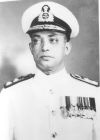₹500








These memoirs, originally published shortly before Ram Dass Katari, the first Indian to head the Indian Navy, died in 1983, are being re-published to mark his birth centenary year.
The book tells the powerful story of the struggle to build independent capability amongst Indians as the country experiences the historic transition from colonization to freedom. Set against this vast canvas is the appealing personal narrative of the rise of a small town lad, Ram Dass Katari, who overcomes several odds, to find himself at the helm of the fledgling Indian Navy in 1958, at the age of 47. He was witness to the unfolding of major national level events while developing a vision for a three dimensional Navy, anchored in the principles of self sufficiency, integrity, discipline and first rate leadership.
He combines a razor sharp intellect and sense of humour, to walk the reader through his diverse and multifaceted career profile which covered key administrative and management challenges at home and abroad – with the highlight clearly being his achievements as Indian Ambassador to Burma at a particularly trying period in Indo Burmese relations.
Whether in service or in retirement, Katari retained the quality of being a perceptive observer and commentator on the growing contradictions and erosion of values in public life – the strengths and weaknesses of our civil service and political leadership. Above all he tells his story like it is – simply, with humour and humility, and with an uncompromising integrity.

Admiral Katari joined the Navy in 1939 and saw action in World War II. He took over command of the Indian Fleet in 1954, and was appointed Chief of the Naval Staff in 1958 – the first Indian officer to assume the highest office in the service. In June 1964 he was specially selected as India’s Ambassador to Burma. The Admiral settled in Secunderabad after his second retirement in 1969. His final years were devoted to public service, compiling crosswords for news-papers, and promotion of sports. He passed away in January 1983 aged 71. His wife Dhanam Katari who survived him for 27 years, was the inspiration behind the Katari Heritage Hall created by the family in Sainik Puri, to commemorate his Birth Centenary.